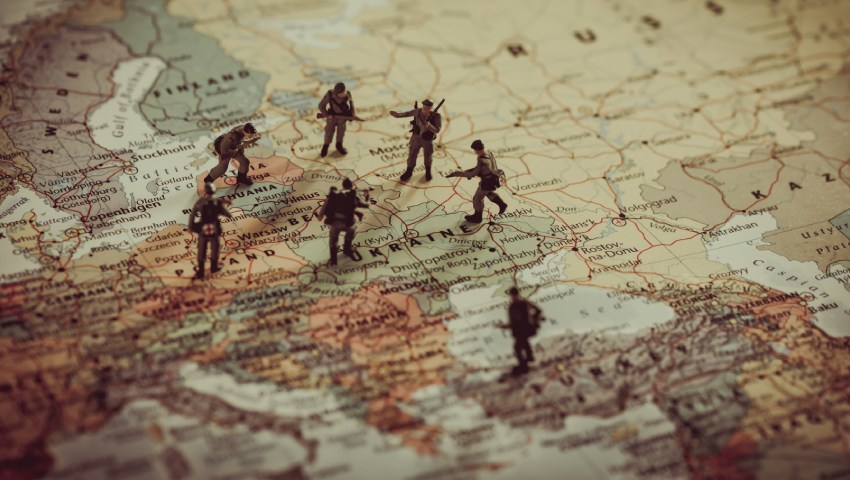Was Russia’s defeat in Ukraine a forgone conclusion following the West’s unanticipated response to the invasion?
To continue reading the rest of this article, please log in.
Create free account to get unlimited news articles and more!
Russian President Vladimir Putin’s authorisation of a full-scale invasion of Ukraine in late February undermined confidence in the global order, with the war signalling a return to large-scale state-on-state conflict in Europe.
In seeking to overrun Ukrainian forces, Russia has suffered thousands of casualties, suggesting President Putin seriously miscalculated the defensive capabilities of Ukrainian forces and the extent of coordinated international resistance to his actions.
Putin had planned to capture Kyiv in just days, however, Russian forces failed to seize the Ukrainian capital despite a prolonged offensive.
Moscow has now focused its efforts on establishing pro-Russian enclaves in the Ukraine’s east, most recently celebrating the reported capture of the city of Mariupol following prolonged resistance from Ukrainian forces.
But when did Russia’s failure to overthrow the Ukrainian government become evident?
According to Stephen Loosley – senior fellow at the Australian Strategic Policy Institute and non-resident senior fellow at the United States Studies Centre – Russia’s defeat was evident moments after it launched its invasion.
In a piece first published on Sky News, Loosley argues that the US-led mobilisation of NATO in support of Ukraine signalled Russia’s defeat.
“Defeat does not loom for the Kremlin – it arrived some time ago when the Biden administration mobilised NATO so effectively after the initial invasion. To Vladimir Putin’s horror, suddenly the West had teeth,” he writes.
“The war in Ukraine is lost to Vladimir Putin and the Russian Empire.
"...Moscow has lost the conflict decisively.”
Loosley points to a series of developments, which he claims suggest “overwhelming Kremlin failures in intelligence and strategic assessments”.
Loosley explains that given Putin’s “disdain for the liberal democracies of the West”, which he perceived were in decline, the coordinated response from the US and its international allies would have surprised the Kremlin.
“What horror must have dawned upon him when the Biden administration did what was not thought possible in the wake of Donald Trump’s dismissal of allies, and mobilised NATO so effectively,” he continues.
“Suddenly, Article 5 of the NATO Treaty, which commits members to mutual assistance, not only had meaning – but it also had teeth.
“And with that came the vast transfer of weapons and technology from the West, including Australia, to embattled Ukraine, on a scale that has not been witnessed in the post-war years.”
In managing the delivery of military and non-military assistance to Ukraine, he adds, the US and its allies “again become the arsenals of democracy”.
Loosley then goes on to reference German Chancellor Olaf Scholz’s pro-Ukrainian address to the Bundestag, which he said foreshadowed a “seismic shift” in European politics.
“At a stroke, Germany rejoined NATO as a substantial and serious contributor. The German defence budget was doubled, and German pacifism retired to the basement,” he writes.
“The fact that the end of the Chancellor’s speech was greeted by a resounding standing ovation by all the parties speaks volumes in the shift in German opinion.”
This, Loosley claims, would have been particularly concerning for the Kremlin, given the strong address was delivered by a leftist coalition government.
“Soothed by the pumping of Russian oil and gas, the Germans have long been regarded as well-disposed to Moscow,” he writes.
Loosley explains that the suspension of the Nord Stream 2 pipeline and the imposition of sanctions on Russian energy reflected a “very hard-headed European and American policymaking”.
Further, Loosley points to Finland and Sweden’s abandonment of a policy of neutrality in pursuit of NATO membership.
“If you are looking for disasters in Russian foreign policy, you would go no further than Finnish and Swedish NATO membership becoming a reality,” he continues.
“Both countries were already de facto members, partners since 1994, working closely with the alliance and sharing intelligence.
“But Finnish membership brings a 1,300km border with Russia from the dimension of neutrality to another possible security concern for Moscow.”
Loosley concludes by noting Russia’s failures would not be lost on Beijing, Moscow’s most powerful ally, which was assured of a quick victory.
“Putin had apparently promised President Xi the Russian army would be in Kyiv in a matter of days. Instead, it has been driven off with heavy losses,” he writes.
“Ukraine has been lost to Russia forever, and the war crimes trials are only just beginning.
“Defeat does not loom for the Kremlin. It arrived some time ago.”
Get involved with the discussion and let us know your thoughts on Australia’s future role and position in the Indo-Pacific region and what you would like to see from Australia's political leaders in terms of partisan and bipartisan agenda setting in the comments section below, or get in touch with

 Login
Login







